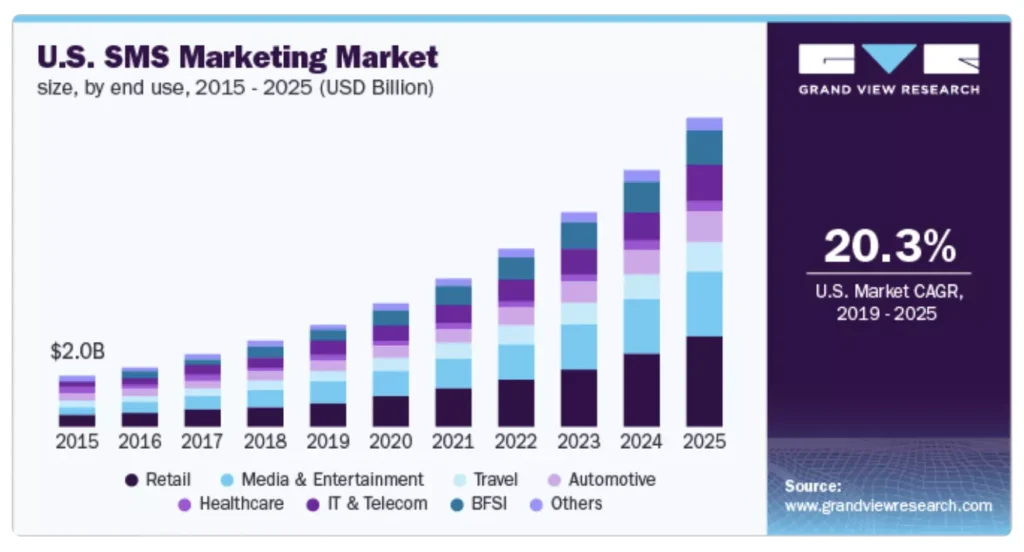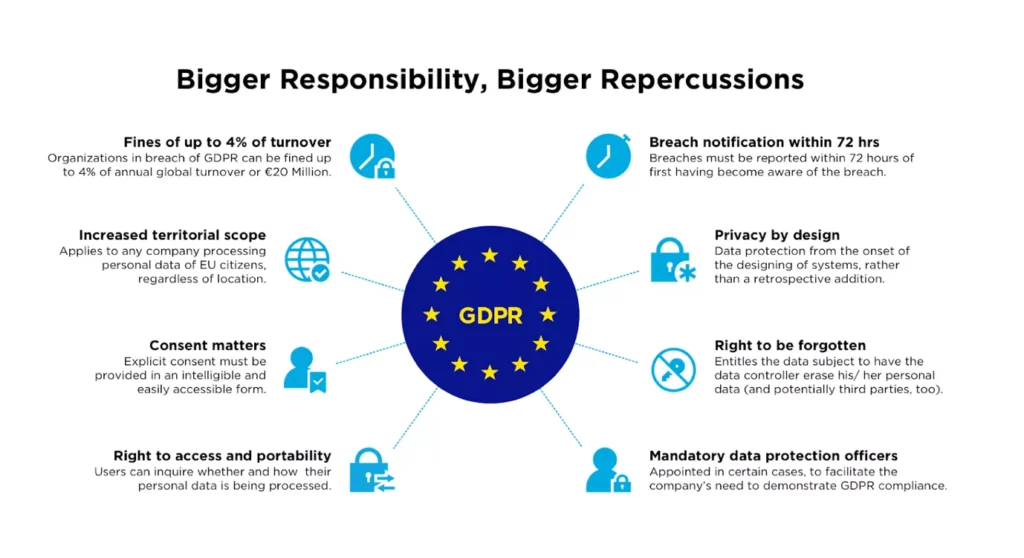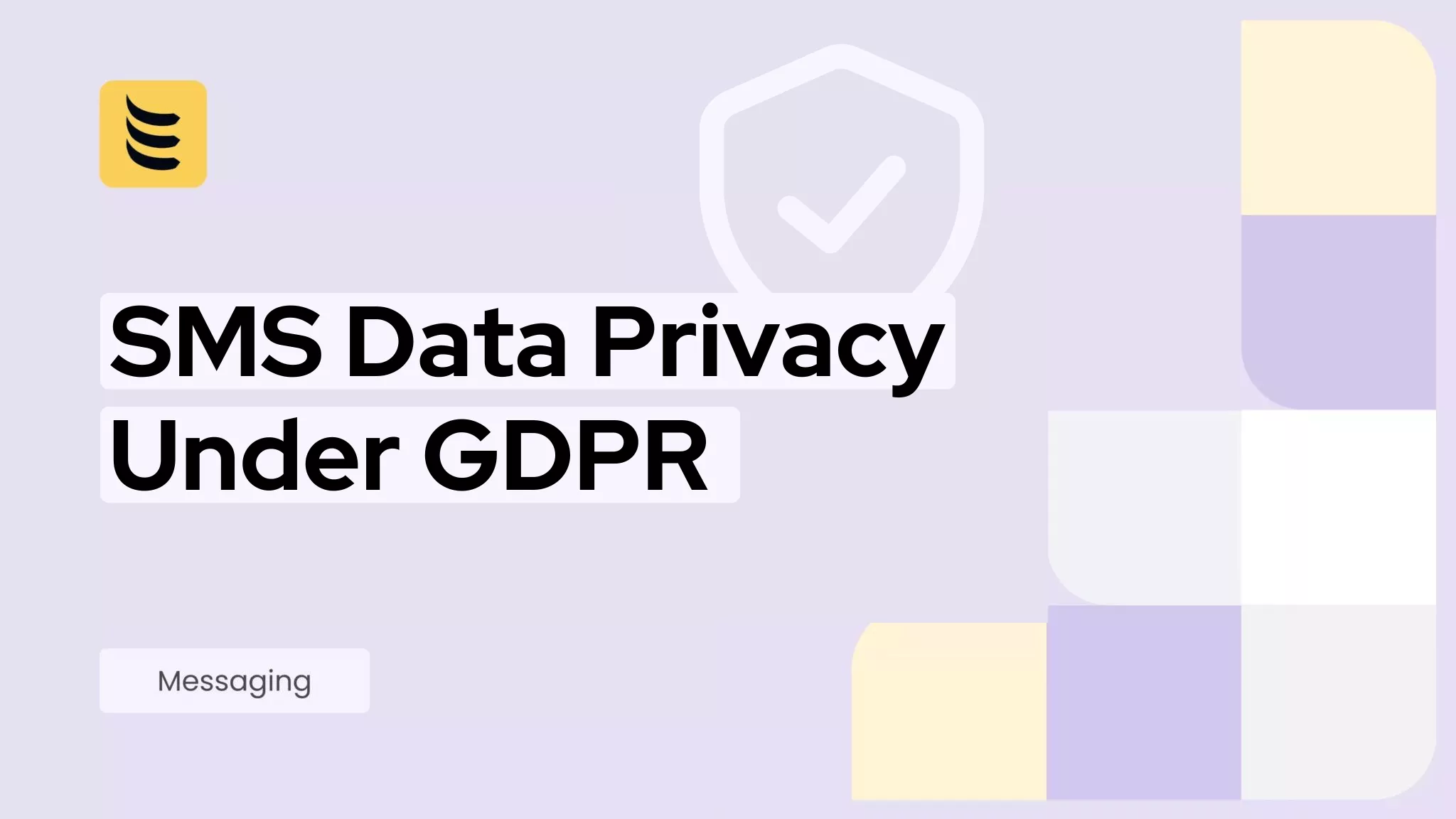The European Union’s General Data Protection Regulation (GDPR) has permanently changed the marketing landscape the world over – and SMS marketers need to pay close attention to ensure they are 100% compliant 100% of the time.
GDPR compliance is nothing short of essential, as being found to be in violation of the rules can lead to huge fines and ruinous consequences for your business.
As an SMS marketer, you may have already gone through the hard work of identifying your target audience and capturing their phone numbers. You may have already strategized your campaign, and even crafted the copy for a string of SMS messages for every lead and customer in every stage of the sales and marketing funnel.
But, before hit send on a single one of those text messages, it is paramount that you review your campaign and confirm without a shadow of a doubt that you are absolutely GDPR compliant.
We don’t mean to scare you. And in fact, there’s no reason whatsoever that you can’t launch highly rewarding SMS marketing campaigns and win lots of new customers for your business. Indeed, SMS marketing is an extremely powerful channel. Recent figures from Grand View Research reveal that the US SMS marketing market is growing at a CAGR of 20.3% from 2019 to 2025, when it will be valued at $12.6 billion.

What’s more, 91% of customers say that they want to receive SMS messages from businesses, and 56% do so already.
Nonetheless, before you can give these customers what they want, it’s crucial that you understand precisely how you can do so in a way that ensures your campaigns are GDPR compatible.
Thankfully, you’re in the right place. In this blog post, we’ll take a deep dive into the General Data Protection Regulation and explain what you need to know about obtaining consent, data collection, and maintaining a robust and GDPR compliant data privacy policy for your SMS marketing campaigns.
What Is the GDPR?
The General Data Protection Regulation is a regulation enforced by the European Union (EU) that governs data privacy and security. Implemented in May 2018, it’s considered one of the strictest privacy laws in the world.
The GDPR applies to any organization processing the personal data of EU residents, regardless of whether or not the organization itself is located in the EU. This means that the GDPR has global implications for businesses with international customers. For example, a business in the US that serves customers in France, Germany, or any other EU country must abide by the rules of the regulation to avoid penalties.
These penalties can be huge. For severe violations of the regulation, fines can be as much as €20 million or 4% of annual turnover – whichever is higher. So, it’s safe to say that all marketers that deal with EU citizen data need to take the GDPR very seriously indeed.
What the GDPR Means for SMS Marketing
The GDPR applies to SMS marketing just like it does with any other form of digital communication. Here are the key elements that SMS marketers need to remember.
Consent Is King
Gone are the days of pre-checked boxes or implied consent. Businesses must now acquire explicit, freely given consent from individuals before sending them marketing messages. This means clear opt-in mechanisms that mention SMS marketing specifically.
Transparency Matters
The GDPR requires organizations to inform individuals about the intended use of their collected phone numbers, which includes the type of marketing content they can expect to receive via SMS. In addition, a clear and accessible privacy policy outlining your organization’s data collection practices is mandatory.

Opt-Outs Must Be Offered
The GDPR doesn’t dictate the specific method, but businesses must provide a clear and straightforward opt-out option within every SMS message they send to customers. Businesses must then respond to opt-out requests as promptly as possible and cease sending SMS marketing messages to the customer immediately.
Data Security Takes Priority
Mobile phone numbers are considered personal data under GDPR. As such, businesses must implement appropriate technical and organizational safeguards to protect this information from unauthorized access, loss, or misuse at all times.
Best Practices for GDPR Compliant SMS Marketing
Remember, the GDPR doesn’t ban SMS marketing. Rather, it ensures that individuals have control over their data and only receive marketing messages they’ve actively opted-in to receive.
Here are the best practices you should adhere to when conducting your SMS marketing. Following them will make sure your campaigns remain legal, while maximizing your chances of commercial success.
Obtain Explicit Opt-ins
Since consent is king when it comes to the GDPR, all SMS marketers must make sure that customers actively opt-in to receive SMS marketing messages. This means that you cannot rely on any form of assumed or implied consent from prospects and customers. You cannot, for example, use pre-ticked checkboxes that state the customer is happy to receive texts from you. The reason is that the customer has to then actively opt-out by un-ticking the checkbox, whereas the regulation mandates the customer needs to actively opt-in by ticking it themselves.
Some ways in which you might obtain proper consent include having the customer:
- Click an opt-in button or link online
- Select from equally prominent yes/no options
- Respond to an email requesting consent
- Sign a consent statement
You also cannot assume consent just because a customer has provided their mobile phone number. Again, even with their phone number, you must obtain the customer’s explicit consent to use it to contact them via text before you do so.
Offer Easy Opt-outs
Once you’ve obtained a customer’s consent to send them SMS marketing messages, you cannot then assume you have their consent forever. A customer may change their mind at any time. As such, it is imperative you have measures in place to make it as easy as possible for them to opt-out of all SMS marketing campaigns.
Typically, to comply with this rule, businesses sign off text communications by saying something like “Text ‘STOP’ to 1234 to opt out from all text message marketing”. Another option is to include a link to the customer’s account from where they can easily unsubscribe or adjust their consent options.
No matter how you do it, as soon as a customer’s consent is retracted, you must immediately remove their phone number from your SMS marketing lists.
Maintain a Robust Data Privacy Policy
Crafting a robust data privacy policy is crucial for GDPR compliance. More than this, however, it’s paramount to fostering trust with your audience.
Here’s how you can ensure your privacy policy is not just compliant but also transparent and user-friendly.
Regular Updates
Your privacy policy should not be a static document gathering virtual dust. Keep it dynamic by revisiting and updating it regularly, especially when there are changes in how data is handled. This demonstrates your commitment to transparency and compliance with evolving regulations.
Accessibility
Make sure your privacy policy is easily accessible. Provide a link to it whenever customers subscribe to your SMS marketing campaigns. Additionally, ensure it is prominently displayed on your website and consider including a link at the end of each SMS message for easy reference.
Comprehensive Content
Your policy should cover all the bases required by GDPR. This includes clear explanations of how data is collected, processed, and stored.
Clarity and Simplicity
GDPR mandates that privacy policies be presented in “clear and plain language.” Avoid legal jargon or overly technical terms that might confuse your audience. Instead, strive for simplicity and clarity so that everyone, regardless of their level of technical expertise, can understand how their data is being handled.
Responsiveness to Change
As your business grows and evolves, so too may your data handling practices. Each time there’s a change in how data is processed or stored, update your privacy policy accordingly. Transparency is key, and your privacy policy should always reflect the current state of affairs regarding data handling.
Transparency
Your privacy policy should serve as the go-to resource for customers seeking information about how their data is processed and where it resides. By being transparent about your data practices, you build trust with your audience and demonstrate your commitment to respecting their privacy rights.
Craft GDPR Compliant SMS Marketing Campaigns with IDT Express
By following these best practices, you can navigate the GDPR landscape with confidence and craft SMS marketing campaigns that are both effective and compliant.
IDT Express offers a suite of solutions designed to streamline your SMS marketing efforts, including reliable message delivery and insightful analytics. Together with a commitment to data privacy, you can unlock the power of SMS marketing to connect with your EU audience and achieve your marketing goals.
To learn more about how IDT Express can help you launch and succeed with GDPR compliant SMS marketing campaigns, book a meeting with our experts today.




